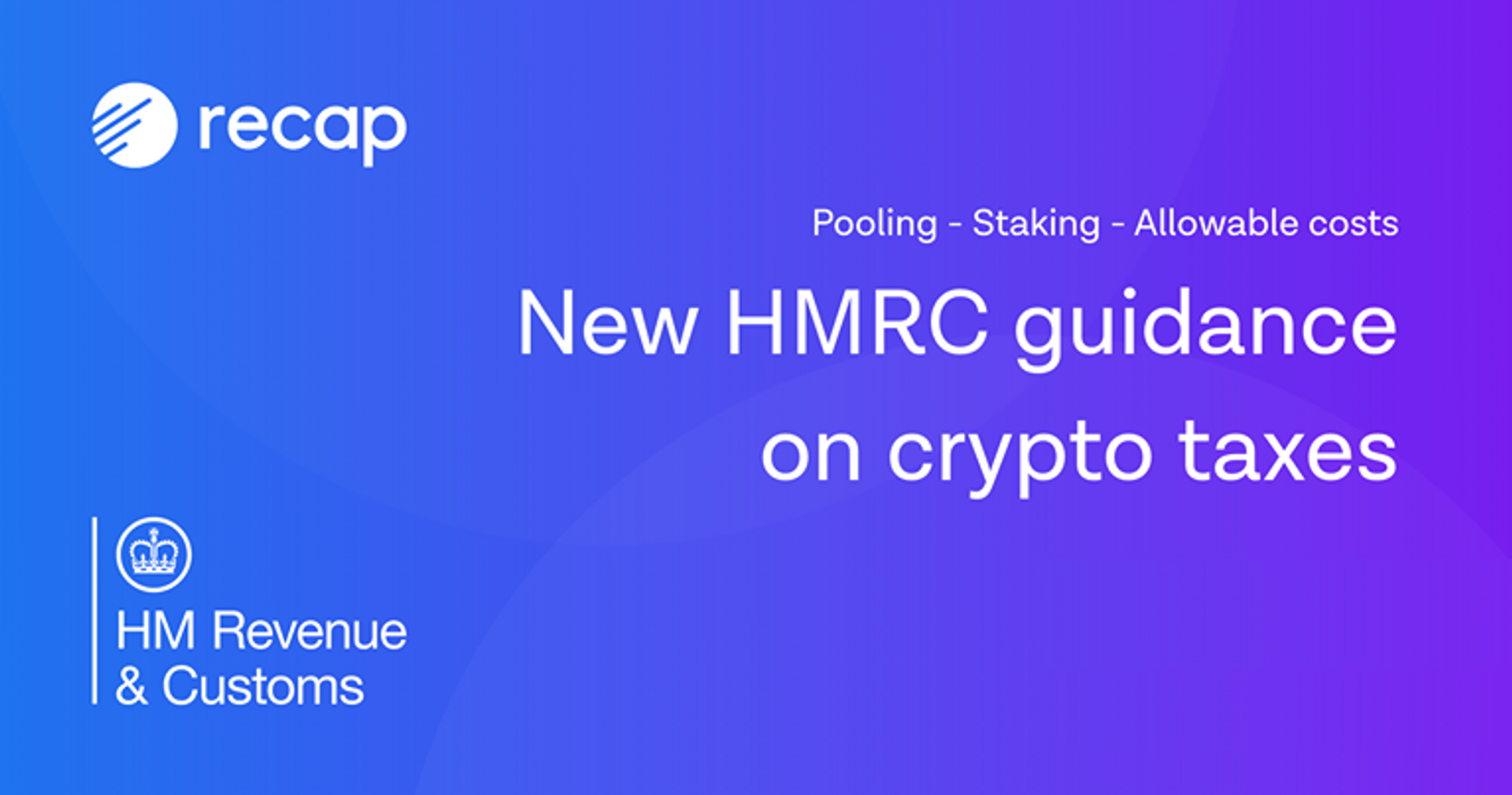
Yesterday HMRC published a ‘Cryptoassets Manual’ which replaces its existing cryptoasset policy papers; published in December 2018 and November 2019. As we expected, there is no material difference to the taxation of cryptoassets for Individuals in the UK; for the time being.
Here at Recap, we aim to stay ahead of HMRC guidance and will ensure our users are aware of changes as soon as they are announced.
So what’s changed?
Overall, not much has changed. The guidance itself has moved to the standard ‘HMRC internal manual’ format which acts as a common reference for HMRC staff and taxpayers. This format separates the content into multiple sections which are both easier to navigate and allows HMRC to update and expand their guidance more rapidly.
We expect the next announcements from HMRC to be the addition of more content over the coming months. This is likely to address the growth and continuing innovation in the market, with topics centred around DeFi, loans and stablecoins.
What does the new update look like for Individuals?
Derivatives
HMRC has added a new section on Derivatives. Recap calculates the net gain or loss of margin and futures trading; which may fall under the derivative definition. It is then up to the user and their tax advisor to decide whether or not to declare the gain or loss as miscellaneous income or capital gains. The new guidance is welcome, but we believe there are still grey areas, so we recommend you seek advice from a professional tax advisor, regarding which tax applies to your derivatives.
A derivative is a financial instrument where the performance is based on the movement of the price of the underlying asset. Under a derivative, the holder does not hold the underlying asset. Some businesses offer the ability for individuals to gain exposure to the movements in the cryptoasset market by using a derivative. It is important to note that derivatives settled in cryptoassets will also have an impact on your capital gains tax position in addition to closing the position.
Where a derivative held by an Individual is not for the purposes of a trade or property business; HMRC states two possibilities for taxation remain: gains/losses may be treated as miscellaneous income, or they may be subject to capital gains.
Capital gains: Where the derivative held by an Individual is a financial future, a commodity future or an option; HMRC confirms at CFM50070 that gains or losses are subject to the capital gains regime. However, HMRC point to further full guidance at CG55400 onwards; so this should also be considered when reaching your own decision on which tax treatment applies to your derivatives.
Miscellaneous income: Where the derivative held by an Individual is not a financial future (for example, an interest rate or currency swap contract), HMRC state at CFM50070 that profits and losses are likely to be taxable as miscellaneous income. HMRC’s views on this point were contained in Tax Bulletin article (TB66, September 2003), which is reproduced at CFM50080.
Non-taxable derivatives: - neither miscellaneous income or capital gains?: Although HMRC states derivatives are either taxed as miscellaneous income or capital gains; in the same guidance at CFM50070, they allude to some derivatives being non-taxable. HMRC confirms that where a derivative is held by an Individual, it is possible for profits to be non-taxable, and losses not relievable; following principles laid down by case law. HMRC state the most common example is spread bets entered into by an individual purely as a wager - see BIM22020. However, they say this will not apply if the spread bet is used for a commercial purpose, for example as a hedge. HMRC give no other examples of non-taxable derivatives, so this remains a grey area and we recommend you seek professional tax advice if you are considering relying on this point.
Staking rewards
HMRC has clarified that, outside of a ‘professional/commercial’ operation, the receipt of staking rewards should be reported as miscellaneous income (rather than interest), with the rewards subject to capital gains tax when disposed of. Recap has always treated staking rewards as income, so there are no changes here.
Allowable Costs
Splitting transaction fees: The manual states that exchange fees for crypto to crypto trades equally apply to the resulting disposal and acquisition. Given that the fee can only be ‘used’ in the CGT computation once, it should be apportioned on a ‘just and reasonable’ basis between the disposal and acquisition, with an HMRC suggested split of 50/50. Other splits are not ruled out, but will be dealt with ‘on a case by case basis’ and may therefore require justification if they were ever queried. This differs from Recap’s current implementation, as we apportion the entire fee to the disposal, so we are discussing this with our accountancy partner and will be speaking to HMRC about this. One option we may consider adding is the option to choose the fee apportionment method, defaulting to a 50/50 split for new users.
Exchange deposit and withdrawal fees are not deductible: HMRC has confirmed these fees are not deductible in the CGT calculation; which is in accordance with our longstanding view. Our Recap CGT Report notes the total of these fees (for user reference) but does not deduct them in the CGT calculation, which is the confirmed correct position. We will be removing the note of total fees from the CGT Report, to aid clarity.
Pooling
Pooling applies to shares and securities and also ‘any other assets where they are of a nature to be dealt in without identifying the particular assets disposed of or acquired’ - also known as fungible assets. Most cryptoassets are fungible and subject to the pooling rules.
HMRC confirm that Non-Fungible Tokens (NFTs) are separately identifiable and so are not pooled in the same way that most cryptoassets are. No examples of an NFT are given by HMRC. Recap is currently investing its approach to NFT’s and would be happy to talk to any customers looking for accounting support in this area.
The new HMRC guidance gives new examples of section 104 pooling, where the tokens are fungible. These have been added to clarify how acquisitions and disposals should consider and follow the same-day and 30-day rules. We have incorporated these pooling examples into our tests, and you’ll be glad to hear that the results match HMRC for examples 1 to 6. Example 7 is a crypto-to-crypto scenario, which uses different valuations for each side of the trades. This is contrary to the common assumption that both sides of a trade on an exchange are of equivalent value; since it is a ‘bargain at arm’s length’ between unconnected parties. We will be investigating this further and discussing the specifics with our tax advisor and HMRC.
This article is intended as an informative piece. This is not accounting or tax advice. If you are unsure as to how this new update will affect you or your cryptoassets; please get in touch through support or contact your accountant/tax advisor.
